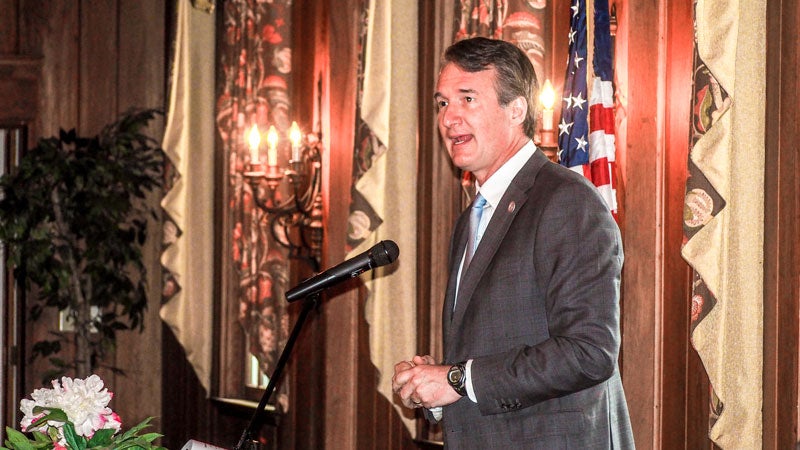Youngkin vetoes bills proposing 1% sales tax option to fund new schools
Published 11:19 am Tuesday, April 9, 2024

- Youngkin (File photo)
Gov. Glenn Youngkin, minutes ahead of his 11:59 p.m. deadline on April 8 to act on this year’s General Assembly bills, vetoed legislation that would have authorized any Virginia city or county to raise its sales tax 1% by voter referendum to fund school construction.
Only nine Virginia localities – Charlotte, Gloucester, Halifax, Henry, Mecklenburg, Northampton, Patrick and Pittsylvania counties and the city of Danville – are afforded the option under current state law. Isle of Wight County has been lobbying for the referendum option for the past three years as a possible means of paying back more than $30 million it borrowed in 2020 and 2021 to replace the circa-1961 Hardy Elementary with a new, larger Hardy that opened in 2023, and to fund the estimated $71 million cost of replacing another 1960s-era school, Westside Elementary.
House of Delegates Bill 805, sponsored by Del. Sam Rasoul, D-Roanoke, and Senate Bill 14, a nearly identical bill by Sen. Jeremy McPike, D-Prince William, would each have abolished the list of authorized localities and expanded the option to all cities and counties.
To override Youngkin’s veto, each legislative chamber would need a two-thirds majority when the General Assembly reconvenes on April 17.
Both bills passed each chamber in February with the requisite two-thirds bipartisan majorities that could potentially hand Youngkin his first-ever veto override. Dels. Nadarius Clark, D-Suffolk, and Otto Wachsmann, R-Sussex, whose legislative districts include parts of Isle of Wight, each supported both bills, as did Sen. Emily Jordan, R-Isle of Wight, Sen. Lashrecse Aird, D-Petersburg and Del. Kim Taylor, R-Petersburg. Aird’s and Taylor’s legislative districts include neighboring Surry County.
Youngkin’s office, in an April 9 statement, said he’d vetoed the bill over concerns that the statewide impact of city- and county-level 1% sales tax surcharges “could result in a nearly $1.5 billion a year tax increase on Virginians.”
Virginia’s statewide sales tax rate currently stands at 5.3% though Williamsburg, James City County and York County already pay a combined 7% state and regional sales tax to promote tourism. The General Assembly, in 2013, authorized an additional 0.7% surcharge on top of the 5.3% statewide rate for Northern Virginia and Hampton Roads to create a 6% rate to fund transportation projects. Were Virginia to allow an additional 1% surcharge for school construction, “Some localities would have a combined sales tax rate of 8%, with no additional offsets, such as reduced income tax or property tax,” Youngkin’s statement asserts.
“The Commonwealth should pursue a tax policy that unleashes economic development and prioritizes job and wage growth through innovative reforms,” Youngkin said. “These reforms must allow hardworking Virginians to keep more of their money, not less; any proposal that increases the cost of living and the cost of business is not a policy we should pursue.”
According to the Richmond Times-Dispatch, Youngkin’s record-breaking 153 vetoes out of 1,046 approved bills this session reflect more in a year than any other recent Virginia governor has vetoed in four.
“We are deeply disappointed by the Governor’s veto of SB14/HB805, which denies our citizens the opportunity to vote on a 1% sales tax for school construction projects,” said Isle of Wight County Supervisor William McCarty. “ This issue has been our top legislative priority for years, and the Governor’s veto without proposing an alternative solution only exacerbates the urgent need to address the school infrastructure needs of Isle of Wight County and other communities across the Commonwealth.”
The Virginia Association of Counties, or VACo, of which Isle of Wight and Surry are members, urged county-level officials in an April 9 email to contact their legislators in hopes of overriding Youngkin’s veto.
“These bills do not require any locality to raise additional revenues unless the localities’ elected leaders and their citizens vote to do so through voter referendum,” states VACo’s email. “This gives parents and citizens a voice in how their children’s schools are funded.”
“Despite this setback, we remain hopeful,” McCarty said. “SB14/HB805 received broad bipartisan support in the Senate and House of Delegates, including all the County’s General Assembly delegation members. We respectfully request that they continue to stand with the citizens of Isle of Wight County and override the Governor’s veto.”
Editor’s note: This story was updated at 2:02 p.m. on April 9 with Youngkin’s veto explanation statement.





